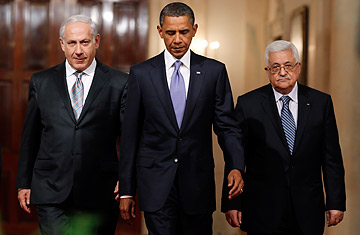
President Barack Obama walks down Cross Hall with Israeli Prime Minister Benjamin Netanyahu (L) and Palestinian President Mahmoud Abbas to make joint statements in the East Room of the White House in Washington September 1, 2010.
"I know what America is," Benjamin Netanyahu, then an opposition politician, told Israeli settlers in 2002. "America is something that can easily be moved. Moved to the right direction." And in the last few months, Prime Minister Netanyahu has proved his point by walking back President Obama's call for a freeze in Israeli settlement construction so much so that the Administration on Tuesday essentially gave up and took it off the table.
The U.S. announced it had abandoned its effort to coax Israel to agree to a single 90-day extension of its partial moratorium on settlement construction; with offers of diplomatic concessions and billions in military hardware, it had hoped the pause could revive Israeli-Palestinian talks that had stalled over settlement construction. Administration officials tried their best to put a positive spin on it, casting the move as retreating from a dead end in order to "explore other ways" of pursuing "substantive" negotiations, as State Department spokesman P.J. Crowley put it. Palestinian leaders declined to join the pollyanna chorus, instead warning that Obama's decision signaled a crisis in the peace process.
Netanyahu's office, however, was crowing. "We said from the outset that settlements were not the root of the conflict and that it was only a Palestinian excuse for refusing to talk," said the Prime Minister's spokesman, Nir Hefetz. And in some respects, he is right. The standoff over settlements is a symptom, not a cause, of the broader stalemate: Given 90 days or 900, there's little reason to believe that Abbas and Netanyahu can agree on the parameters of Palestinian statehood.
For the Palestinians, settlements were a central issue because they saw them as a litmus test of Netanyahu's willingness to give up occupied land. The Israeli prime minister had resisted President Obama's initial demand for a "complete settlement freeze" in line with Israel's obligations under President Bush's 2002 peace "roadmap", eventually offering a time-limited moratorium that exempted settlements in East Jerusalem, where Israel's claim to sovereignty is not recognized by any other country. When that moratorium expired in September, after just three sessions of talks, Abbas pulled out of the process, refusing to continue as long as settlements were being built. The Palestinians had hoped that they could use Netanyahu's opposition to a settlement freeze to demonstrate that the Israeli government is politically incapable of offering a deal acceptable to the Palestinians — and that Washington needs to press Israel to move towards the international consensus for a Palestinian state based on the 1967 borders, with East Jerusalem as its capital.
But despite the generosity and cajoling of Washington, Netanyahu has been unable or unwilling to extend it; in the process he has tested Obama's willingness to go the mat with Israel and take the domestic political heat that such a confrontation inevitably brings. In the end, Obama officials gave up on the moratorium after concluding, correctly if belatedly, that even if they could get Netanyahu to extend it, there was little chance of the two sides agreeing on borders between Israel and a Palestinian state within a 90 day window. The respite, then, would have been only temporary.
Even if it can't get Israel and the Palestinians talking, don't expect the Obama Administration to reprise former Secretary of State James Baker's 1991 response of repeating the White House phone number to Israel's then Prime Minister Yitzhak Shamir and saying: "When you're serious about peace, call us." The U.S. simply has too much invested in sustaining the appearance of progress. U.S. allies in the Arab world are dependent on Washington delivering justice for the Palestinians. Even General David Petraeus, when commanding Centcom, made clear in testimony to Congress that addressing Israeli-Palestinian conflict was vital to the prospects of the U.S. achieving its goals throughout the Muslim world, saying the conflict was "the root cause of instability" in the region. "The enduring hostilities between Israel and some of its neighbors present distinct challenges to our ability to advance our interests," Petreaus testified. "Arab anger over the Palestinian question limits the strength and depth of US partnerships with governments and peoples in the region and weakens the legitimacy of moderate regimes in the Arab world."
